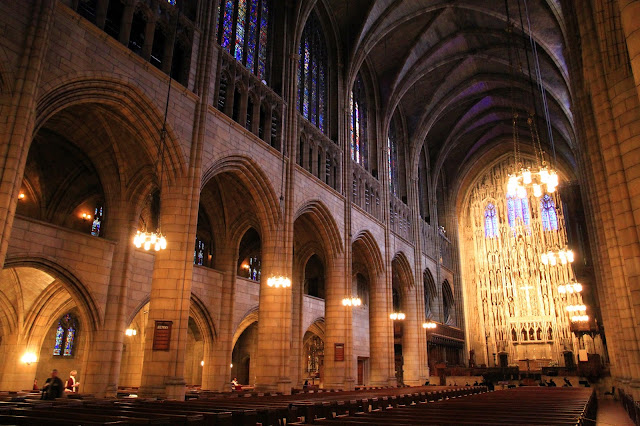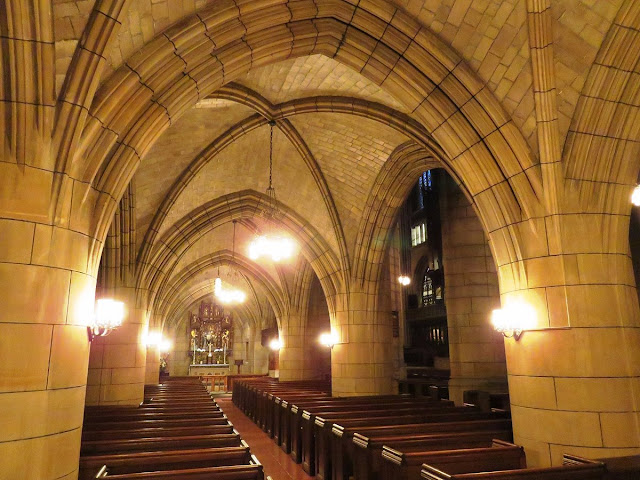"What? Start singing Frosty the Snowman?" he chided incredulously. (*in fact,the word "chided" has roots in ancient pagan Rome). No, I replied, there are hundreds of lovely upbeat/inspiring Christmas carols… and he (and his organist/choir director) had picked so many dry/solemn ones. "Oh, so you want a version of the movie 'Sister Act', where the choirs jazz it up?" he joked. Nope. (although the revised music did save the church, in that film)
"But Advent is a solemn season," he said, "some cultures even begin fasting in their diets." I replied that the churches which instill Christmas spirit in people will garner more support from them. It's as simple as that. I suggested having the pipe organ, brass ensembles, handbell choir and vocal choirs perform evenings of Christmas carols… perhaps a performance for each group. In addition to the solemn songs. Lots of churches sing merrily before Christmas Day.
I suggested going Christmas caroling through the neighborhoods. And to those who are "shut in". Especially near the subways. Its all about visibility and outreach. It'll also give the proud parents something to support. It'll also give the musicians' and choristers' friends something to support. Conduct a food drive at the local well-known grocery stores. Announce the events on the church's website, via emails, from the pulpit, and through the church newsletter. The more people you can imbue with a special sense of faith, uplifting spirit, sense of community and enthusiasm, the more they will respond. If you're as wealthy as the Vatican, then you can maintain a solemn liturgy--even on Christmas Eve--as they do.
*To see our visit to the Vatican, please click this link:
I sent him a list of songs from my own iPod playlist (including some unique secular ones for neighborhood caroling):
Zither Carol
Noel, Noel, Bells are Ringing
Masters in this Hall
Ding Dong! Merrily on High
Angels from the Realm of Glory
Sing We Now of Christmas
Bring a Torch, Jeanette Isabella
Fum, Fum, Fum
Noel Francais
Good King Wenceslas (the do-good King of Bohemia)
Heigh Ho the Holly!
Once in Royal David's City
Sing We Enchant It
Still Still Still
Tu Scendi Dalle Stelle
In Sweetest Jubilee
Bright, Bright the Holly Berries
The Holly and the Ivy
Christmas Eve in My Home Town
Here We Come A Caroling
I've Got My Love to Keep Me Warm
O Tannenbaum
The Secret of Christmas
Silver Bells
Warm December
December Time
You Don't Have to Be A Santa Claus
Christmas Dreaming
Christmas Is
Cool Yule
God Rest Ye Merry Gentlemen
I Wouldn't Trade Christmas
I've Got the Christmas Spirit
Kissing By the Mistletoe
Over the River and Through the Wood (even though its a Thanksgiving song)
Ring Those Christmas Bells
Runnin' On Eggnog
That Holiday Feeling
He was impressed.
He began to back-peddle, saying that things are the way they are… just because thats the way its always been. That is false! I responded by indicating that Jesus hadn't been born in December. He was a summertime baby (the shepherds and sheep were sleeping in the pastures at night). As scholars have pointed out, the Church moved Christmas to December, as a recruitment and membership-gathering technique. They wanted the support of certain pagan/other-religious groups, and those groups had pre-existing festivals/feasts in December. Thus, Christmas was moved to December, as a Win-Win scenario.
So, whats wrong with tweaking the song list during Christmas, in another attempt to attract more support? And singing cheerful carols throughout the community will help enrich others, too. He didn't have an answer, and it made him think. He said that he didn't dislike the ideas.
(if they don't mind putting Christmas lights on the nativity scene {as if THAT is authentic}, then perhaps they won't mind singing more cheerily)
He then made the comment that church-going folks might not like varying too much from church doctrine. Really? That also brought to mind the millions of people who are devoutly religious… but who still regularly participate in superstitious/pagan rituals. For example, in the archipelago-nation of Greece, they don't use Christmas trees. Instead, they keep a wooden bowl of water in their homes with a basil leaf wrapped around a wooden cross in it. Daily, someone dips the cross into the water and sprinkles water throughout their home. Why? To keep away the bad spirits. In England, they celebrate Epiphany by burning the yule log and going into the orchards to drink and sing "wassail" to bring a bountiful harvest. Germany and the Baltic nation of Latvia have similar notions. In the Nordic nation of Finland, they eat star-shaped cookies, but if any cookie should break into 3 pieces, all the pieces must be eaten silently… and a wish will come true. *Lewis and I ate one of them in Finland, and it was scrumptious! To read about that trip, please click this link:
Zither Carol
Noel, Noel, Bells are Ringing
Masters in this Hall
Ding Dong! Merrily on High
Angels from the Realm of Glory
Sing We Now of Christmas
Bring a Torch, Jeanette Isabella
Fum, Fum, Fum
Noel Francais
Good King Wenceslas (the do-good King of Bohemia)
Heigh Ho the Holly!
Once in Royal David's City
Sing We Enchant It
Still Still Still
Tu Scendi Dalle Stelle
In Sweetest Jubilee
Bright, Bright the Holly Berries
The Holly and the Ivy
Christmas Eve in My Home Town
Here We Come A Caroling
I've Got My Love to Keep Me Warm
O Tannenbaum
The Secret of Christmas
Silver Bells
Warm December
December Time
You Don't Have to Be A Santa Claus
Christmas Dreaming
Christmas Is
Cool Yule
God Rest Ye Merry Gentlemen
I Wouldn't Trade Christmas
I've Got the Christmas Spirit
Kissing By the Mistletoe
Over the River and Through the Wood (even though its a Thanksgiving song)
Ring Those Christmas Bells
Runnin' On Eggnog
That Holiday Feeling
He was impressed.
He began to back-peddle, saying that things are the way they are… just because thats the way its always been. That is false! I responded by indicating that Jesus hadn't been born in December. He was a summertime baby (the shepherds and sheep were sleeping in the pastures at night). As scholars have pointed out, the Church moved Christmas to December, as a recruitment and membership-gathering technique. They wanted the support of certain pagan/other-religious groups, and those groups had pre-existing festivals/feasts in December. Thus, Christmas was moved to December, as a Win-Win scenario.
So, whats wrong with tweaking the song list during Christmas, in another attempt to attract more support? And singing cheerful carols throughout the community will help enrich others, too. He didn't have an answer, and it made him think. He said that he didn't dislike the ideas.
(if they don't mind putting Christmas lights on the nativity scene {as if THAT is authentic}, then perhaps they won't mind singing more cheerily)
He then made the comment that church-going folks might not like varying too much from church doctrine. Really? That also brought to mind the millions of people who are devoutly religious… but who still regularly participate in superstitious/pagan rituals. For example, in the archipelago-nation of Greece, they don't use Christmas trees. Instead, they keep a wooden bowl of water in their homes with a basil leaf wrapped around a wooden cross in it. Daily, someone dips the cross into the water and sprinkles water throughout their home. Why? To keep away the bad spirits. In England, they celebrate Epiphany by burning the yule log and going into the orchards to drink and sing "wassail" to bring a bountiful harvest. Germany and the Baltic nation of Latvia have similar notions. In the Nordic nation of Finland, they eat star-shaped cookies, but if any cookie should break into 3 pieces, all the pieces must be eaten silently… and a wish will come true. *Lewis and I ate one of them in Finland, and it was scrumptious! To read about that trip, please click this link:
An Ecuadorian friend of mine, who wears a cross around her neck and goes to church every Sunday, still follows the custom of putting an upside down broom near her front door, to keep unwanted people away. Despite their Catholicism, Colombians still practice some pagan rituals for prosperity (below).
Another Latin American friend prefers keeping a glass of water behind her door, to absorb bad spirits. Lewis knows that even Asian Christians go to church but also keep fruit/incense offerings (at home and in their businesses) for Buddhas--to bring prosperity and ward off evil. Many people of all faiths strongly believe in feng shui (as do I). Many modern Catholic Italians are wary of "the evil eye", keep loaves of bread right-side-up (since bread is the symbol of Christ) to maintain good luck, have older relatives who esteem witchdoctors, believe in good omens, and say incantations when New Moons appear.
Things being the way they are, some well-arranged and well-performed music (done with "heart") might bring the Word into understanding through invigorated and opened minds.
Another Latin American friend prefers keeping a glass of water behind her door, to absorb bad spirits. Lewis knows that even Asian Christians go to church but also keep fruit/incense offerings (at home and in their businesses) for Buddhas--to bring prosperity and ward off evil. Many people of all faiths strongly believe in feng shui (as do I). Many modern Catholic Italians are wary of "the evil eye", keep loaves of bread right-side-up (since bread is the symbol of Christ) to maintain good luck, have older relatives who esteem witchdoctors, believe in good omens, and say incantations when New Moons appear.
Things being the way they are, some well-arranged and well-performed music (done with "heart") might bring the Word into understanding through invigorated and opened minds.


































































































